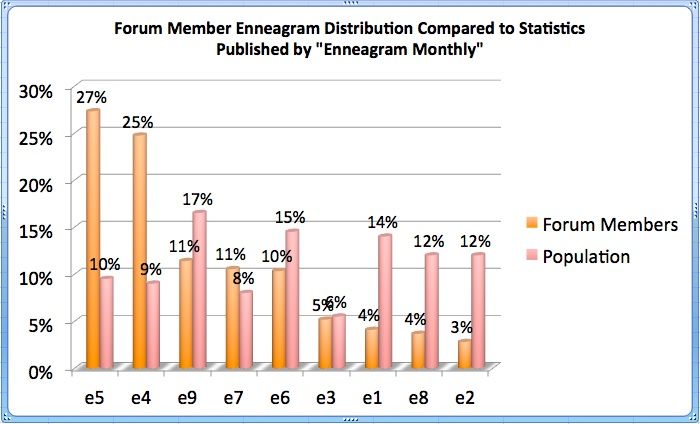- Joined
- Dec 23, 2009
- Messages
- 26,706
- MBTI Type
- INTJ
- Enneagram
- 6w5
- Instinctual Variant
- sx/sp
I've always thought the percentage of 3s would be far greater within the population. Quite surprising they appear the lowest.
United States
Types Three, Six, and Seven
I was referring to the population. Not the forums.no, they just post the most because they're 3s
On the contrary. It seems like the forum is as 6-obsessed now as it used to be INFJ-obsessed...
As everyone knows by now, I think a lot of people are 6s who are mistyping as someone else. I am pretty sure that not all the 4s and 5s on this forum are 4s and 5s (not saying they are all 6s!).
6 received extremely negative "publicity" here at least, for quite some time. Lots of comments like "all 6s are terrified and haunted", and "you can't be an INFJ if you are a 6." There are "fashions" on this forum like there are anywhere. It was very unfashionable for some time to be typed as a 6. People seem to be moving on from that but I think 6s are still under-represented, especially as they're apparently the most common type in the world.
On the contrary. It seems like the forum is as 6-obsessed now as it used to be INFJ-obsessed...
Re bolded - I recall hearing that somewhere, but the RHETI statistics do not match that. They 9>4>2>7>5>6. There are twice as many 9s as there are 6s.
I was one of those mis-typed people for a while. Tests kept coming up as 8, which was wrong. I wasn't biased towards any type of Enneagram because I knew almost nothing about Enneagram at the beginning.
Re bolded - I recall hearing that somewhere, but the RHETI statistics do not match that. They 9>4>2>7>5>6. There are twice as many 9s as there are 6s.
I don't know where you are getting this from.
It should be pointed out that the Rheti stats come from people taking the test at their website in 1998 rather than a representative sampling of the population in 2012 ("Note that the type distribution shown reflects the personality type of people on the Net as well as that of people who find the test interesting enough to take it.").
It may show the same trend, of course, but shouldn't be automatically assumed to be the same as global population trends. I don't know of a better source for the latter either, though.
Nice stats and presentations highlander
Very interesting!
I think the difference between general population stats and those on the Rheti page would be interesting in itself. (And I too remember hearing that e6 is the most common but I can’t remember where.)
I thought I’d seen estimates for general population somewhere, but can’t find any just now. Even the page highlander linked has a disclaimer on how it based on the self reporting of couples who sought therapy (?, that’s what I gather). I skimmed through both Riso books and the Helen Palmer book and there’s no mention (that’s easy to find, anyway) of stats. If I come across something, I’ll come back and post it.
[/MENTION].

